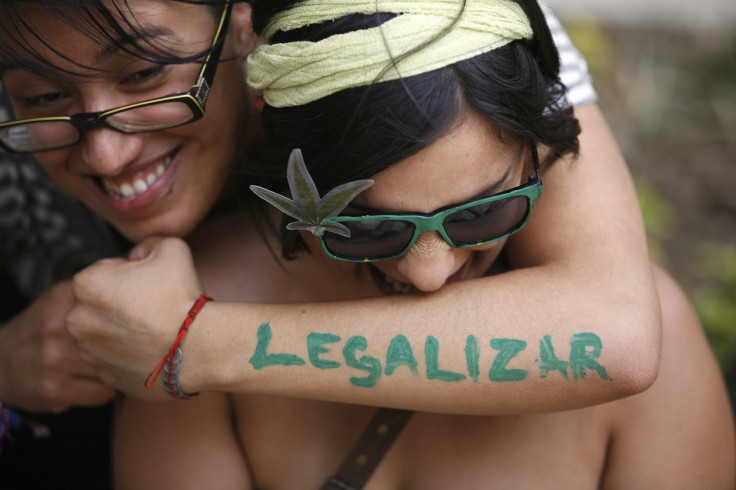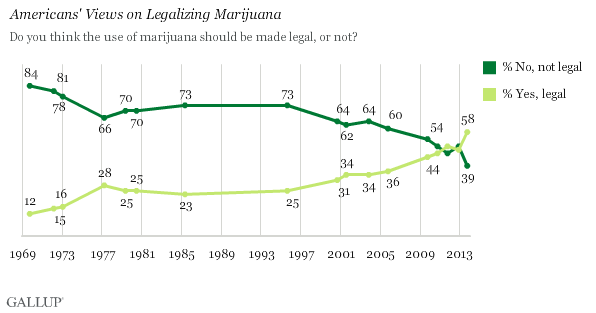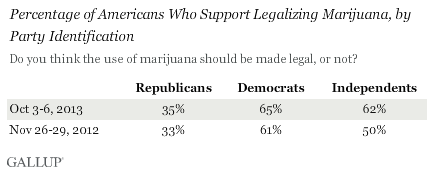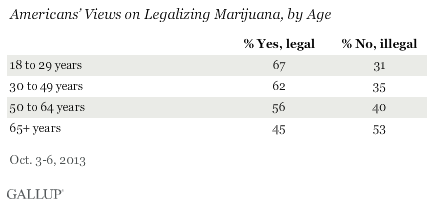Marijuana Legalization Favored By Majority Of Americans For First Time In History: 58% Support Legal Use

In the past year, Colorado and Washington legalized full recreational use of marijuana. The only two states to do so, they sit beside nearly two dozen other states in which medical marijuana is legal in regulated amounts. The latest Gallup poll has now quantified this growing acceptance, showing that, for the first time ever, the majority of Americans favor marijuana legalization.
In 1969, when Gallup first asked the U.S. “Do you think the use of marijuana should be made legal, or not?” acceptance carpeted the floor at 12 percent. That rate more than doubled in the ensuing decade, rising to 28 percent in 1977, and after a steady several decades, hovering right around 30 percent all through the 80s and 90s, acceptance began to soar. Between 2000 and today, acceptance jumped from 31 percent to 58 percent – and experts believe it will only continue to rise.

Portland, Maine, for instance, is slated to complete the triumvirate of pot legalization with a Nov. 5 election. Largely a symbolic move – due to pot’s illegality under both state and federal laws – marijuana supporters hope the municipality’s election will stir a broader East Coast movement, particularly in a country where the West Coast has so far acted alone.
"I think there's national implications, keeping the momentum that Washington and Colorado started last November in ending marijuana prohibition," David Boyer, political director of the Marijuana Policy Project in Maine, told Fox News. "This is just the next domino."
Back on the West Coast, California is making waves as its second-highest-ranking elected official, Lt. Gov. Gavin Newsom, said last week that he believes weed should be legal in the state, and regulated similarly to cigarettes.
"To me, it's like smoking anything else, he told the San Jose Mercury News. “I want a regulatory regime that doesn't advertise to kids, that doesn't allow public use and secondhand smoke."
Gallup’s latest data show political divides persist, despite the growing acceptance among the general public.

More surprising is the shrinking disapproval among older poll respondents. Young people remain the largest population of proponents – supporting legalization 67 percent of the time – but their parents have also switched sides, as 56 percent of 50- to 64-year-olds responded favorably for legalization. Holding steady are the oldest respondents, those 65 and up, who made up the only age group to say “No” more often than “Yes” (53 to 45 percent).

The trend is a curious one. It has mirrored national acceptance of gay marriage laws nearly in full, which has experts pointing in that direction as a contributing factor. But larger than that, explanations run the gamut, from science’s contributions – more information suggests marijuana alleviates various root causes of pain, including chronic back pain and chemotherapy’s side-effects – to loosening cultural morals.
A previous Gallup poll, for instance, shows 38 percent of people admit to having tried marijuana at least once as of 2013. In 1969, that number was a measly four percent.
“With Americans' support for legalization quadrupling since 1969, and localities on the East Coast such as Portland, Maine, considering a symbolic referendum to legalize marijuana,” the Gallup report states, “it is clear that interest in this drug and these issues will remain elevated in the foreseeable future.”



























